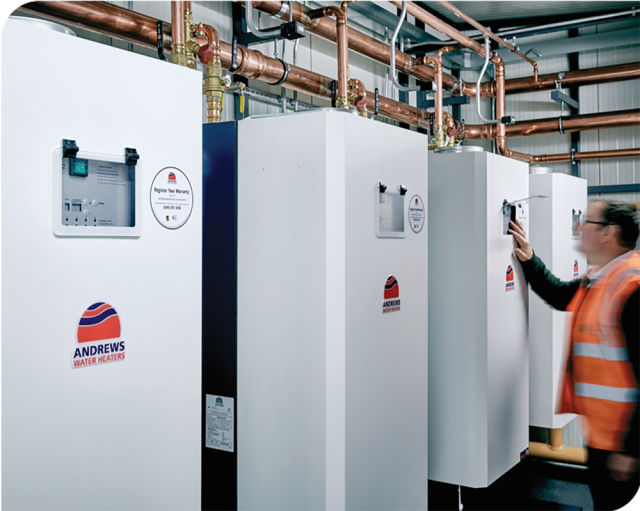Into hot water

Tom Murray explores some of the most important factors relating to water heater specification.
Co-working spaces in the UK are on the rise, resulting in an increase in the use of shared facilities and a subsequent fluctuation in the demand for hot water. This means that the hot water supply needs to be able to deliver at any time and at any capacity, not least because these are spaces on the market in a competitive sector.
New technology and a growing inclination to seek more flexible working patterns has contributed to the rise of the co-working space. This developing approach to business provides a viable, office-like alternative for independently working individuals or small business owners who are not located in a traditional office setting, but equally do not wish to work from home.
These multi-use spaces are indicative of the changing nature of work. Indeed, a report from Cushman & Wakefield in 2018 titled Flexible Office Space, highlighted that in the UK co-working spaces host on average around 121 individuals which is up 81% from 2016 . Additionally, investment management company JLL predict that 30% of all commercial office space will be shared by 2030 .
Co-working spaces lend themselves to a variety of uses, offering meeting rooms, studios and desk space for a wide range of professionals. However, this new way of working provides individuals with more control over their working lives meaning they are no longer bound by the notions of 9-to-5. Therefore, the spaces they choose to work in are volatile to rapid and unpredictable changes in occupancy totals.
Often utilised by start-up businesses, co-working spaces are susceptible to altering team numbers as enterprises increase or decrease their workforce size. This means that, operators of co-working spaces will need to ensure that there is a continuous supply of hot water to wash basins, showers, catering and toilet facilities, to meet the growing demands and expectations of occupants.
Specifying a hot water generating appliance for this type of property is not without its challenges. Unlike a traditional office block, the number of users will continuously fluctuate based on user requirements, resulting in a subsequent shift in hot water demand. Further, the owners of the property will want to ensure that the property is as energy efficient as possible to reduce operating costs with particular attention paid to energy bills in order to maximise competitiveness.
While a condensing boiler might have been the traditional choice for some specifiers in this situation, this is arguably not the most energy efficient choice. Just think about it for a moment, a condensing boiler efficiency would typically be above 90% and might seem suited to the job at-hand, but it is worth remembering that a heating boiler cannot operate in condensing mode when generating domestic hot water. As such, when these appliances are generating hot water, they do so at a rate up to 10% less efficient than when it operates in condensing mode.
A boiler coupled with a calorifier might not be the most appropriate source of hot water generation for buildings with varying requirements. Arguably, specifiers should look to specify separate systems with dedicated plant for each use, meaning each plant item can be sized much more closely to meet the specific requirements of the building. Therefore, they would be much better suited to the subsequent demands of office workers.
For example, a high efficiency condensing water heater will not lose efficiency during the generation and supply of hot water. It will provide water at the required temperature (typically 60oC to 65oC) yet still operate in condensing mode. This protects the reputation of the specifier by ensuring that the operators of the co-working spaces are not left out of pocket by unexpected energy bills as a result of lower-than-expected efficiency.

Space is at a premium in any office, and with co-working areas particularly so as a reduction in usable floor space results in fewer desks and ultimately, fewer customers. Specifiers should be mindful of this when making a decision about which hot water generating appliance to specify. Using an indirect calorifier and including its associated pumps, valves and controls would require more floorspace, compared to that required for a direct gas fired water heater. This would allow the owners of the property to invest in opening up more front of house floorspace to potential customers – boosting commercial returns, all the while maintaining a continuous supply of hot water.
For those building owners who are not willing to compromise on internal floorspace, specifiers could look to the roof of the property for a solution. Specifying water heating appliances at roof level comes also with its own challenges. For example, specifiers will need to check that the roof can cope with the weight of the water – in this instance a direct gas fired water heater having much less storage would weigh considerably less than a boiler and a calorifier meaning that they can be specified on rooftops in a greater number of properties.
Co-working spaces are a competitive field, finding a source of hot water generation that can keep energy costs low and boost efficiency at the same time, is a priority for such commercial ventures. Specifiers can help businesses to stop counting the cost of hot water provision by ensuring that the water heater specified is not larger than that required. A larger than necessary appliance could result in higher energy costs due to heating more water than what is needed by the end-users.
It’s important therefore for the specifier to get to know the requirements of the business. Asking questions such as: Does the co-working space have shower facilities? Are there any kitchen facilities? What are the peak working times and operating hours? These early checks with the client can pay dividends by ensuring that the provision of hot water doesn’t end up putting the business out of pocket in the short term and facing rising costs in the future.
Specifiers are in a unique position in making sure that a co-working space has an adequate – and continuous – supply of hot water, without which the business could suffer reputational harm. When specifying a water heater, “savings” are a key part, whether the business is interested in saving energy, space or cost, direct gas-fired water heating appliances. With demand for co-working spaces only set to increase over the next two decades, increased demand for utilities such as gas and water will come to be a core consideration for specifiers of water heating appliances in commercial properties.
Specifiers with an eye to the future can get ahead of the curve by specifying an energy efficient, space-saving water heater, keeping emissions and costs low, efficiencies high, and customer satisfaction levels at an optimum level.
Tom Murray is specification director at Baxi Heating







